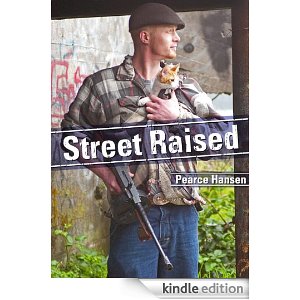 1. How did you come to self-publish? Did you try to get published traditionally?
1. How did you come to self-publish? Did you try to get published traditionally?
Why re-publish my novel STREET RAISED for the Kindle? For me there’s a sense here of striking while the iron is hot, and of dissatisfaction with what currently feels like a traffic jam in the whole brick & mortar book sales system due (in my opinion) both to panic over the current economic meltdown, and the impact of the new technologies on the traditional publishing process.
Technically this is not ‘self publishing,’ but rather the digital re-release of a traditionally published book. My second novel STAGGER BAY is under representation with the Donald Maass Literary Agency, and I’m 70K words into my third – this is just my way of keeping backlist active. Heck, last time I checked signed copies of the first edition of STREET RAISED are going for $80 at Abebooks – it’s a freaking collector’s item!
STREET RAISED was first traditionally published in 2006; it had an agent, an ISBN number, and was edited by Allan Guthrie. It had a Borders book signing, a respected Russian indie director optioned the movie rights, and it was even in submission for the 2006 Edgar for Best First Novel.
The print version of STREET RAISED garnered blurbs from Ken Bruen, Jason Starr, Joe Lansdale and Anthony Neil Smith. It got a nice review in the SF Chronicle by Eddie Muller. It was also reviewed in Spinetingler, Crimespree and Hardboiled Magazine, and at Bookgasm and Thuglit. Jess Mowry, Andrew Vachss, James Frey – all of them said they liked it as well.
2. What self-publishing service did you use? Happy with the service?
I used Amazon’s Kindle Direct Publishing for Kindle sales, and Smashwords for other ereader formats. KDP is pretty straightforward; I’m having some trouble formatting my anthology GUN SEX for Smashwords, but that one’s probably on me.
3. What avenues have you taken to market the book? Have you gotten reviews, interviews, TV, print media coverage?
In 2006 I was very aggressive. Locally I got a review in the Eureka Times-Standard, an interview in the North Coast Journal and on the radio at KHSU, hosted the auction of a donated copy of the book on public television, and had a book signing at our local Borders. It’s unclear to me what effect all that had on sales if any.
Online and in print I secured reviews from the most prominent sites, magazines and newspapers that would have me; including the ones listed above in answer to Question #1, I probably got at least a dozen major reviews. Also, in my enthusiastic folly, I reached out to very stellar authors, surprisingly many of whom were graciously willing to read my book and blurb it; at least half a dozen world renowned authors have been willing to do so. THOSE efforts, I think, have impacted whatever positive reception STREET RAISED has enjoyed.
4. What drove you to write this particular book?
Suffice to say my family environment was less than idyllic, and that I grew up with little positive adult supervision. At a tender age I had intimate interactions with people occupying many of the links in the food chain of the Life.
Staying out all night, seeing and experiencing things a kid probably shouldn’t. Hanging with outlaw bikers and Black Panthers, punk rockers and crooked undercover cops, pimps and thieves. Running the streets of Oakland, Alameda and Berkeley with my other feral little hellion friends – most of whom are dead now, or in prison, or in and out of mental institutions, or ‘whereabouts unknown.’
As for myself, I have been homeless on numerous occasions, and a drug addict who broke the law to support my habit. I have been incarcerated briefly here and abroad (though never in prison myself). Not a cargo of experience recommended for amateurs, the old definition of ‘adventure’ definitely applies: ‘terror in retrospect.’
What can I say? The streets are a dead end and ‘the Life’ is a bitch – always has been, always will be.
I started writing per se on a fluke – I was chauffeuring my wife to and from college, a creative writing class was open next to hers, and my initial assignment was to write about a personal experience. The first story I ever wrote was ‘Speedy’s Big Moving Day,’ which was ultimately published in Anthony Neil Smith’s Plots With Guns!, anthologized in the Dennis McMillan collection of the same name, and provided the inspiration for my first novel STREET RAISED.
In ‘Moving Day’ I fictionalizing the actual events that transpired when I helped my best friend’s brother-in-law recover all his worldly goods, which were stolen from him by a gang of drug dealers who kicked him out of his own house and took it over to sell from; I recruited a truck full of skinhead friends with baseball bats, and ‘justice’ of a sort was served. Ah, youth!
My creative writing teacher creamed his jeans, and I commenced my first outburst, a series of cathartic writings. I revisited some pretty dark places strip mining my own experience growing up in Oakland and the East Bay.
But in the end, after a lot of bullying and chivvying on the part of friends and family, I opted to try my hand at the novel format. Inspired by those events from my youth, and shoe-horning reality into the template structure of story arc, my little fictions ultimately gelled into a crime novel and STREET RAISED was the result.
5. Is the book in any one particular genre? Is it a genre that’s familiar to you?
Well, I’ve been shoe-horned into ‘crime fiction,’ but I didn’t choose that genre – it chose me.
‘The Life’ is in my past now, decades gone. I have been with my wife for over 20 years. I have successfully raised my son. I have no complaints.
I am no poster child for the Underbelly – many of my friends survived much worse than I did. Nor am I smugly boasting of any attainment to ‘normalcy,’ of having become a ‘Citizen’ (even though it still feels like a masquerade sometimes).
If anything the schizophrenia of having a foot in both those worlds often makes for awkwardness and difficulty. Still, such a parallax view may help me produce writing of interest to the reader even if synthesizing such disparate experiences is jarring at times for me.
We have to be clear here: while based on an actual milieu (Oakland in the 80s, then Murder Capital of the USA) STREET RAISED is fiction. This is not a memoir, nor am I telling ‘tales out of school’ or naming names (don’t kill me brothers, I swear its not based on YOU) – but it’s also as close to a guided tour of the underbelly of the East Bay as an outsider is ever likely to get. With all these disclaimers, I must still confess that STREET RAISED is very autobiographical.
6. Who are your greatest writing influences?
Jack Vance for understatement with simultaneous splendor of language and muted-though-intense emotional content; Elmore Leonard for letting the plot and the characters rule the story: letting the plot unfold like a flower; and the Roman historians for clarity and terseness: Caesar, Tacitus and Suetonius.
7. What’s your writing regimen? Any tips for keeping focused?
When I first started, I won’t deny that alcohol was heavily involved: the old cliché, “I’m a writer – I DRINK.” In my case it was probably also because, as I say, I was strip mining some pretty dark emotional places to put the feelings and sensations of the experience down on paper.
Music on headphones, loud. Usually late at night, sometimes til dawn and then vampire til sundown – almost a reprise of when I was in ‘the Life,’ now that I think about it.
Keeping focused? Don’t have any advice on that, I just lock in and go. Writer’s block has never been a problem for me – my writing brain is a NASCAR racer, which means unfortunately that it spends most of its time on a trailer being hauled from one track to another rather than being driven. But when I’m in the zone, when I’m writing? Then watch my words howl baby.
8. Would you self-publish again?
Too early to tell. But so far, at least I’m in control of my own destiny, and STREET RAISED is getting traction again after sitting around doing nothing as backlist.
An aside about one way in which self publishing is superior: a reader spotted a serious typo in STREET RAISED soon after the Kindle launch. Within an hour that person had contacted me to point it out. Within another hour I had eliminated the typo, uploaded the corrected proof to Kindle. That could NEVER happen with traditional publishing.
Make no mistake: I’ve been a reader since I was a little kid, I love books, and as a writer it was and is still my dream to get print books published by a traditional house and sold in physical stores – but given my experience after 15 years of writing and paying my dues, I’d be remiss not to explore these new opportunities.
9. Any final words of advice for those looking to self-publish?
I think there’s a lot of opportunity here, but a lot of the rules haven’t changed. You have to write – not WANT to write, plant your butt in the chair and crank out the words – “you can fix a bad page, you can’t fix a blank page.” You have to be true to your craft, and have a certain level of innate talent so that you’re not wasting the reader’s time. You have to learn to edit mercilessly.
THEN, you have to take advantage of the new milieu: trends and ereader architecture changing unceasingly; old social media fading away while endless new ones pop up that you “have” to plug into. Blog. Get reviews. Reach out to prominent authors within your genre.
And write, dammit.
Get an Editorial Review | Get Amazon Sales & Reviews | Get Edited | Publish Your Book | Enter the SPR Book Awards | Other Marketing Services









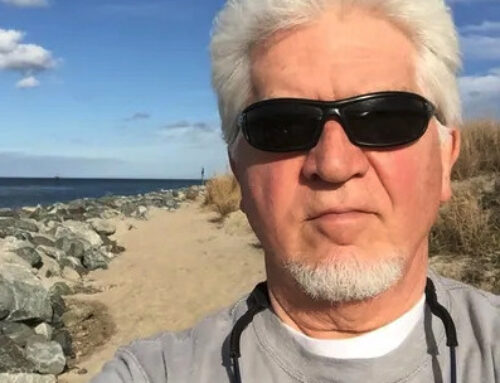
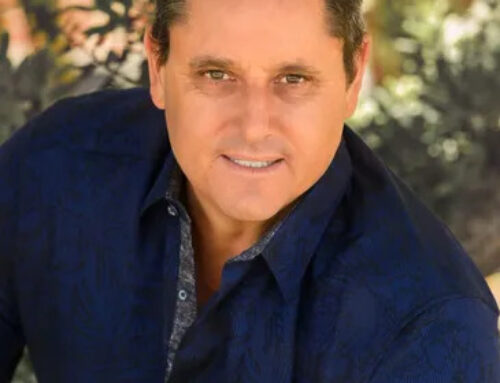
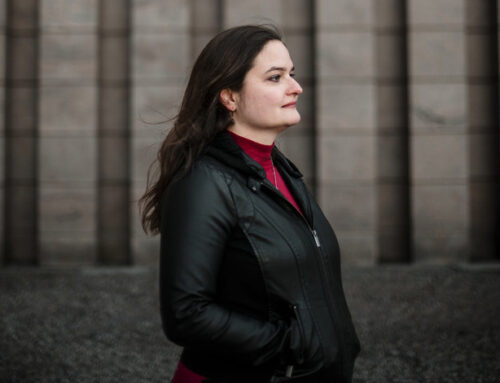
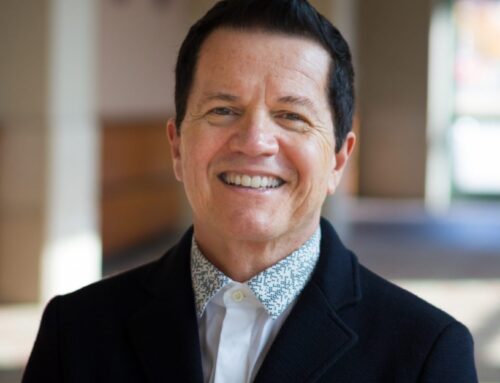







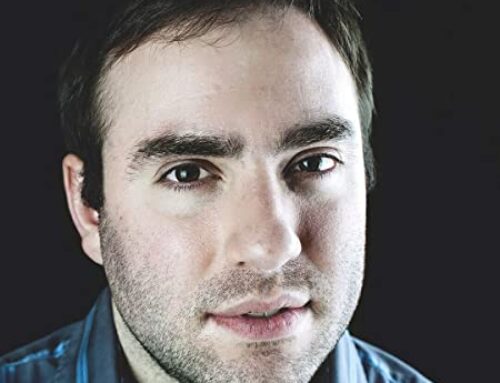

Great interview! Thanks for posting it.
It seems so simple, but that’s extreme advice and encapsulates my two favourite writing quotes: “Writing is the art of applying the seat of the pants to the seat of the chair”, and “Write it down then get it right.”
Thanks